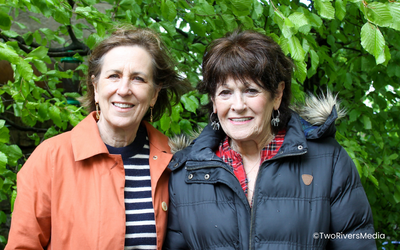You are here
- Home
- Research
- Research clusters
- Feminism, Law and Gender
- IWD 2023 - Embrace equity
- Women's equality in Scotland: its history and future
Women's equality in Scotland: its history and future
Blog post by Dr Kim Barker
Academic advisor for the Open University/BBC Scotland documentary The Women Who Changed Modern Scotland, Dr Kim Barker, explores the development of women’s equality, its history and its future.
When we think of women in the 21st century, as well as mothers, sisters, friends, we think world leaders, politicians, international footballers, journalists, and scientists developing vaccines for diseases like Covid-19.
Women in Scotland have not always been thought of or recognised in this way. Throughout history, women have had to fight against society’s ideas of what a woman should be, and the role women should play. As recently as the 1970s women were regarded as the property of a husband, ridiculed for thinking it was possible to not only run for election, but win. The idea of a woman leading the country was laughable.
 The Open University/BBC Scotland co-production The Women Who Changed Modern Scotland explores how women have had to fight against deeply traditional, and often misogynistic attitudes over the last 50 years, attitudes which have often repressed them and their ambition.
The Open University/BBC Scotland co-production The Women Who Changed Modern Scotland explores how women have had to fight against deeply traditional, and often misogynistic attitudes over the last 50 years, attitudes which have often repressed them and their ambition.
Misogyny is a belief that men are superior to women. It can result in hatred or extreme violence, but also leads to behaviours including rape, harassment, violence against women and domestic abuse. The hatred underlying misogyny is often seen – though less often recognised – in attitudes which ensure women are treated as lesser than men.
Scotland has a long history of deeply embedded misogynistic attitudes within its society. Even with the arrival of second-wave feminism in the late 1960s and early 1970s, these attitudes persisted. Women’s issues – and successes – were overlooked in politics and in society.
With the emergence of the women’s movement in Scotland from the 1970s onwards, things began to change."
With the emergence of the women’s movement in Scotland from the 1970s onwards, things began to change. The society, norms and attitudes that men had made were being challenged by women. Women were no longer to be relegated to roles focussing on childcare and domestic chores.
Rising equality, and women taking up leadership positions in Holyrood and Westminster, as well as in Scottish organisations such as Engender, Zero Tolerance, Women’s Aid, and Rape Crisis Scotland meant more significant change by the 1990s. Women were beginning to reshape a society which consistently demonstrated misogyny in the news, across social spaces, and in everyday life.
The prominence of women at the highest policy and government levels in Scotland across the 2000s has been integral to putting serious social issues affecting women as political and social priorities.
With gender firmly on the agenda, much has been achieved in responding to and tackling violence against women and girls in Scotland. The Domestic Abuse (Scotland) Act 2018 is recognised worldwide as the ‘gold standard’ of legal responses to domestic violence. Progress has also been made on other women’s issues, including period poverty and recent hate crime reforms.
Women appearing prominently in all walks of Scottish society is a sign of huge progress in the campaign for equality, but the costs are still high."
Women appearing prominently in all walks of Scottish society is a sign of huge progress in the campaign for equality, but the costs are still high.
Women are increasingly subject to abhorrent abuse on social media. The impacts are profound, with prominent politicians quitting frontline politics because of the toll it takes. While physical forms of violence and abuse are widely condemned, much is still to be done to address non-physical violence, including online violence against women.
In the 60s and 70s women and girls were told not to walk home alone when dark, or to have their keys in their hands, just in case.
In modern Scottish society, threats to women are still prevalent, with policing facing a crisis of trust given widely acknowledged discrimination, violence, and misogyny. These are consistent barriers. Women continue to fight for their rights, to protect themselves from violence, and to secure representation.
As we move towards International Women’s Day on 8 March and we celebrate progress, much is still to be done.
The three-part series The Women Who Changed Modern Scotland will air at 10pm on BBC Scotland on 21 February, 28 February and 7 March 2023. The entire series is also available to view on BBC iPlayer.
Visit OU Connect to access supporting content for the series. This includes blogs and two short films focussing on the barriers to and the benefits of women in politics.
Pictured left to right: Kirsty Wark, OU honorary graduate and presenter of The Women Who Changed Modern Scotland, with Elsie Cook, former Secretary of the Scottish Women’s Football Association. ©TwoRiversMedia
